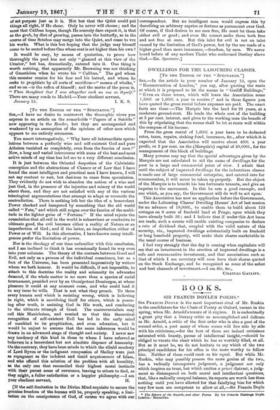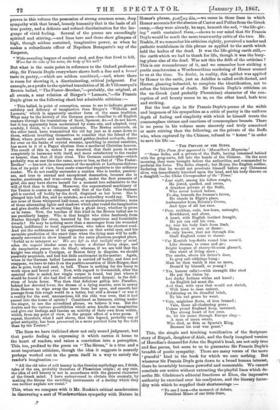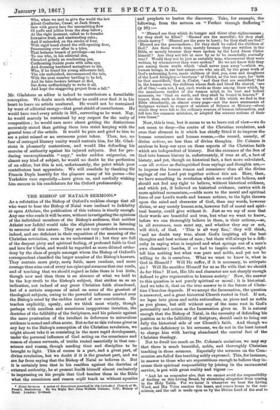BOOKS.
SIR FRANCIS DOYLE'S POEMS.*
SIR FRANCIS DOYLE is the most important rival of Mr. Ruskin in the candidature for the Chair of Poetry at Oxford, vacant in the spring, when Mr. Arnold's tenure of it expires. It is undoubtedly a great pity that a literary critic so acccomplished and delicate as Mr. Arnold, a critic of the first order who is also a poet of the second order, a poet many of whose verses will live side by side with his criticisms,—for the best of them are indeed criticisms saturated with beauty, poems of intellectual insight,—should be obliged to vacate the chair which he has so worthily filled, at all. But as it must be, we do not hesitate to say which of the two principal candidates for his office is the more worthy to follow him. Neither of them could rank as his equal. But while Mr. Ruskin, who may possibly possess the more genius of the two, has a radically intemperate judgment, a judgment not only which inspires no trust, but which excites a priori distrust, a judg- ment so distempered on both moral and intellectual questions, that, like a radically unequal balance, its reports are worth less than nothing until you have allowed for that falsifying bias for which very few men are competent to allow at all,—Sir. Francis Doyle • The Return of the tioardr, and opicr rpm By Sir Francis Hastings Doe& London: Macmillan.
proves in this volume the possession of strong common sense, deep sympathy with that broad, homely humanity that is the basis of all true poetry, and a delicate and refined discrimination for the lan- guage of vivid feeling. Several of the poems are exceedingly spirited and stirring,—and lines here and there show glimpses of high, though seldom sustained, imaginative power, as when he makes a subordinate officer of Napoleon Bonaparte's say of the Emperor,
"Wide-sounding leagues of sentient steel, and fires that lived to kill, Were but the echo of his voice, the body of his will."
But what is the main point in reference to the Oxford professor- ship, Sir Francis Doyle everywhere shows both a fine and a broad taste in poetry,—which are seldom combined,—and, where there is room for showing it, a discriminating, critical judgment. For example, as a prefix to the spirited translation of M. de Villemarqud's Breton ballad, "The Foster-Brother,"—probably, the original, at all events, a near relation of Burger's "Leonora,"—Sir Francis Doyle gives us the following short but admirable criticism :— " This ballad, in point of conception, seems to me to indicate greater subtlety and delicacy of imagination than Burger's Wilhelm and Leonora,' which is apparently another form of the same tradition. What may be the history of the German poem—familiar to all English readers through the translations of Scott, Spencer, &c.—I do not know, but it has apparently been modernized by some one, and adapted, very crudely, I think, to a Christian audience. The Breton minstrels, on the other hand, have transmitted the old lay just as it came down to them, without troubling themselves to consider that the Island of the Blest, where youths and maidens, amid golden-fruited orchards, dance for ever on the banks of crystal streams, sparkling in eternal sunshine, has more in it of a Pagan elysium than a media3val Christian heaven. The result of this is, unless I am deceived, that their poem is more completely in harmony with itself, and more satisfactory to the reader or hearer, than that of their rival. The German catastrophe—which probably was at one time the same, more or less, as that of 'The Foster- Brother — has now, in consequence of the monkish or Lutheran disloca- tion of its point of view, been made somewhat repulsive to the ordinary reader. We do not readily surrender a maiden who is tender, passion- ate, and true to eternal and exceptional damnation, because she is tender, passionate, and true—even though, under the first pressure of grief, she may have shown herself for a moment less submissive to the will of God than is fitting. Moreover, the supernatural machinery of the Teuton is coarse as compared with that of the Celt. The German girl is carried off bodily by the devil, disguised as her lover. She is plunged into hell fire, and no mistake, as a schoolboy would say. There are none of those whispered half-tones, or mysterious possibilities ; none of those alternating lights and shadows which play round the imagination and give double effect to anything like a ghost story, whether in prose or in verse. Now, the touches of this kind in the Breton ballad are to me peculiarly happy. Who is that knight who rides fearlessly from Nantes through the river, haunted by the capricious and formidable dwarfs? He may be nothing more than a messenger from his wounded friend, indifferent to local superstitions, who takes the shortest road. And yet the suddenness of his appearance on that awful spot, and his accurate prediction of the exact time when the dying man will be suffi- ciently recovered to show himself in the same phantom-peopled place, 'forbid us to interpret so.' We are kit in that twilight state of mind, when the unquiet shadow seems to become a distinct living shape, and the imagination passes into the blood; whereas, if we are told that the knight was simply a Corrigan, or Breton fairy in disguise, we should passively acquiesce, and feel but little excitement in the matter. Again, when in the German ballad Leonora is carried off bodily, and does not reappear, we have to take it on the positive assertion of Herr Burger, that she is gone, body and soul, to hell. There is nothing for the fancy to work upon and brood over. Now, with regard to Gwennolak, after the spectral ride is ended, her virgin corpse is found, but just where it would be found if she had died of exhaustion and despair, in the deli- rium of brain fever. Was then that delicious gallop into Paradise, behind her devoted lover, the dream of a dying maniac, sent in mercy from Heaven to wipe away the tears from her eyes, and smooth her passage from this rough world to a better, but still a dream ? or was it a reality for the soul, unconscious, till the ride was over, that it had passed into the home of spirits ? Considered as listeners, sitting under the singer, to use the accredited phrase, we believe it was. But the doubts and the various possibilities which arise kindle our imagination and give our feelings and fancies an activity of their own from within, which, from my point of view, is the proper effect of a true poem. I repeat, therefore, what I said above, that this legend, probably one of great antiquity, has been preserved in a more poetical form by the Celt than by the Teuton."
The lines we have italicized show not only sound judgment, but that poetic feeling in expressing it which carries it home to the heart of readers, and raises a conviction into a perception. This, too, prefixed to the poem on "The Sirens," is a true and a most important criticism, though the idea it suggests is scarcely perhaps worked out in the poem itself in a way to satisfy the reader's imagination :— " All the old tales of evil beauty in the Grecian mythology are, I think, tales of the sea, probably therefore of Phamician origin ; at any rate, the idea of evil beauty is not in accordance with the general character of the Greek mind. I have endeavoured to obviate this anomaly, by making the Sirens the unwilling instruments of a destiny which they can neither explain nor resist."
This, when we compare with it Mr. Ruskin's critical anachronism in discovering a sort of Wordsworthian sympathy with Nature in
Homer's phrase, putgoq ciia,—we mean in those lines in which Homer accounts for the absence of Castor and Polluxfrom the Greek camp,—they were already, he says, beneath the sod, "the life-giv- ing" earth contained them,—shows to our mind that Sir Francis Doyle would be much the more trustworthy critic of the two. Mr. Ruskin, if we remember his criticism rightly, perceived a tender and pathetic truthfulness in this phrase as applied to the earth which held the bodies of the dead. It was the life-giving earth still,— the earth which we had to thank for life, though it was the bury- ing-place also of the dead. Was not this the drift of the criticism? This is our remembrance of it, and we remember how striking a poetic anachronism a Wordsworthian rendering of Homer seemed to us at the time. No doubt, in reality, this epithet was applied by Homer to the earth, just as Achilles is called swift-footed, and Hector, glancing-helmeted, to complete the identification, not to soften the bitterness of death. Sir Francis Doyle's criticism on the un-Greek (and probably Phcenician) character of the con- ception of evil beauty seems to us, on the other hand, both true and striking.
But the best sign in Sir Francis Doyle's poems of the width and largeness of his sympathies as a critic of poetry is the uniform depth of feeling and simplicity with which he himself treats the commonplace virtues and emotions of commonplace breasts. There is no poem in his volume more sincerely and truly conceived or more stirring than the following, on the private of the Buffs who, when captured by the Chinese, refused to " kotou " in order to save his life :—
"Tax PRIVATE OF THE BUFFS.
"This Poem first appeared in 'Macmillan's Magazine.'
"'Some Seiks, and a private of the Buffs, having remained behind
with the grog-carts, fell into the hands of the Chinese. On the next morning, they were brought before the authorities, and commanded to
perform the kotou. The Seiks obeyed ; but Mope, the English soldier,
declaring that he would not prostrate himself before any Chinaman alive, was immediately knocked upon the head, and his body thrown on
a dunghill.'—See China Correspondent of the Times.'
"Last night, among his fellow roughs,
He jested, quaffed, and swore, A drunken private of the Buffs, Who never looked before.
To-day, beneath the foeman's frown,
He stands in Elgin's place, Ambassador from Britain's Crown, And type of all her race.
"Poor, reckless, rude, low-born, untaught, Bewildered, and alone, A heart, with English instinct fraught, He yet can call his own. Ay, tear his body limb from limb, Bring cord, or axe, or flame:
He only knows, that not through Ain: Shall England come to shame.
"Far Kentish hop-fields round him seem'd, Like dreams, to come and go ; Bright leagues of cherry-blossom gleam'd, One sheet of living snow ; The smoke, above his father's door, In grey soft eddyings hung : Must he then watch it rise no more, Doom'd by himself, so young ?
"Yes, honour calls !—with strength like steel He put the vision by. Let dusky Indians whine and kneel ; An English lad must die.
And thus with eyes that would not shrink, With knee to man unbent, Unfaltering on its dreadful brink, To his red grave he went.
"Vain, mightiest fleets, of iron framed ; Vain, those all-shattering guns ; Unless proud England keep, untamed, The strong heart of her sons. So, let his name through Europe ring— A man of mean estate,
Who died, as firm as Sparta's King, Because his soul was great."
This, the simple and tpuching versification of the Scripture story of Rizpah, daughter of Aiah, and the finely imagined version of Herodias's demand for John the Baptist's head, are not only true and fine poems, but seem to us to guarantee Sir Francis Doyle's breadth of poetic sympathy. There are many verses of the more ' graceful ' kind in the book for which we care nothing. But wherever Sir Francis Doyle gets down to a broad human interest, there he invariably becomes powerful and memorable. We cannot conclude our notice without extracting the playful lines which de- scribe Mr. Gladstone's editorial functions at Eton, the impressive authority he exercised over his coadjutors, and the literary fecun- dity with which he supplied their shortcomings :—
" To one I turn—the monarch of debate, President Minos of our little State, Who, when we met to give the world the law About Confucius, CitetiaZ, or Jack Straw, Saw with grave face the unremitting flow Of puffs and jellies from the shop below ; At the right moment, called us to forsake Intrusive fruit, and nnattending cake; And if unheeded, on the stroke of four, - With rigid hand closed the still-opening door, Denouncing ever after in a trice,
That heinous breach of privilege—an ice— To one who in his editorial den,
Clenched grimly an eradicating pen, Confronting frantic poets with calm eye, And dooming hardened metaphors to die. Who, if he found his young adherents fail,
• The ode unfinished, uncommenced the tale, With the next number bawling to be fed, And its false feeders latitant or fled, Sat down unflinchingly to write it all, And kept the staggering project from a fall."
Mr. Gladstone as editor is indeed to contributors a formidable conception. We doubt much whether he could ever find it in his heart to leave an article unaltered. He would not be restrained by want of editorial energy—that great shield of contributors. He would have read every article in MS., correcting as he went. Nay, he would scarcely be restrained by any respect for the unity of composition ; he would care more about getting the distinctions accurately stated than getting them into strict keeping with the general tone of the article. It would be pain and grief to him to see a point missed or an erroneous point taken. Then, too, no fear of outraged literary vanity would restrain him, for Mr. Glad- stone is pleasantly contentious, and would like defending his exercise of authority against his injured subjects. But for pro- ducing unexceptionable "copy," under sudden exigencies, on almost any kind of subject, he would no doubt be the perfection of an editor, but this is not, unfortunately, the point which poor contributors best appreciate., We will conclude by thanking Sir Francis Doyle heartily for the pleasure many of his poems—the Yorkshire race especially—have given us, and cordially wishing him success in his candidature for the Oxford professorship.
































 Previous page
Previous page